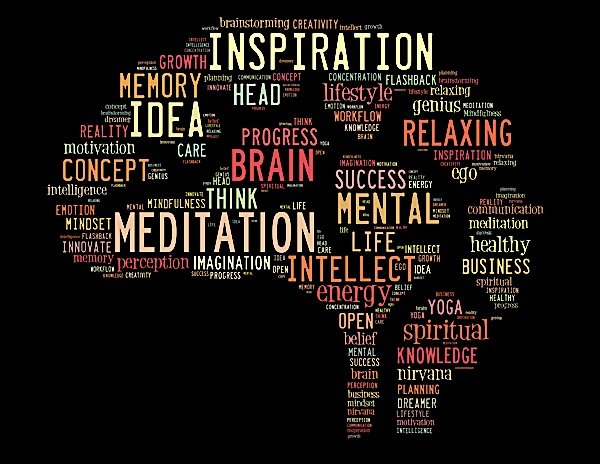Can Buddhism actually help you become a successful professional? The Eightfold path and core meditation techniques may actually be good for business.
Buddha’s Dharma teaches the eightfold path, which could be a ready-made mission statement for any morally upright business person or corporation: I, we, will conduct ourselves with right livelihood, right effort, right mindfulness, right concentration, right speech, right action, right thought, right view. Any corporation could do well with such an amazing mission statement.
Guest writer Sarah Jacobs, however, goes well beyond these core moral guideposts in proposing:
How Buddhism Can Help You Become a Successful Professional

By Sarah Jacobs
Mindfulness of breathing and loving-kindness meditation virtually define Buddhism practice. Meditation is the art and process of contemplation, deep thinking and reflection that can eventually help you let out negative energy and thoughts for a more hassle-free and stress-free life.
Buddhist meditation also comes in different types — each is designed to overcome a different type of problem and psychological state. The most common however are Anapana Sati (Mindfulness of Breathing) and Metta Bhavana (Loving Kindness Meditation).
Anapana Sati: Mindfulness of Breathing
Anapana Sati is the one that we commonly see on television and popular culture, but this is the type of meditation that is perfect for beginners too. Mindfulness of Breathing is done in a peaceful and quiet area — sitting on the floor with folded legs and a straight back. (Or, just sit comfortably.) Meditation should be done with the eyes closed while focusing on just breathing in and out. This is primarily done to relax the mind and instil discipline.

Metta Bhavana, on the other hand, can only be done once you have already mastered Anapana Sati. This is still done similarly to Anapana Sati, but instead of simply focusing on just breathing in and out, you repeat aspirations, mantras or comforting words such as, “May I be well and happy. May I be peaceful and calm. May I be protected from dangers. May my mind be free from hatred.” This type of meditation is perfect if you want to flush out those negative thoughts and feelings and replace them with a more peaceful, positive and contented state of being.
Such meditational practices are not just done for your own spiritual and psychological well-being, but it can be used to improve your personal and professional life as well. Learning the art of meditation or practicing Buddhism can help you become successful professionally because:
-
You get to learn compassion and empathy.
Tensions and conflicts could happen in the workplace because misunderstandings with a coworker or boss are always inevitable. Mastering the art of meditation will help you encourage a more tolerable approach to others, and it will help you develop a deeper understanding of them. This will help you build better relationships at work that will help you broaden your mind and improve overall productivity. This is better than being judgmental and intolerable with other’s situation and mistakes. It will help you build better character instead, rather than being unhelpful and negative towards others.
Compassion for yourself (self-acceptance) is also important especially when you are looking for a job. Mindfulness meditation helps you become more confident and comfortable in your own skin, and this can help you win interviews during job applications.

-
You can easily let go of petty troubles and misunderstandings.
Not letting go of squabbles and conflicts in the workplace will result in a negative and miserable life. It will eventually affect your attitude towards work, your boss, co-workers, and even towards friends and other people outside work.
Since Buddhism lets you learn self-discipline and compassion, letting go of any negativity becomes easier. This characteristic is also a sign of maturity. There is no need to react to every little thing that bothers you because that could only just be a waste of energy. Choose your troubles, and choose them wisely. Focus your attention and energy on bigger and more important things – like completing a task or project rather than involving yourself in office gossip.
-
You will learn to steer clear of distractions and focus on the best path.
Distractions could come in many forms, and this could affect your professional life. But Buddhism can teach you discipline and focus, and this could be very useful in your professional life and dealings. This helps you keep your eyes on the prize and stick to long-term plans and goals religiously.
One major type of distraction is the practice of instant gratification. Although rewarding yourself once in awhile is a good thing, it is not okay if you do this often even if your successes are still premature or if you are actually trying to save up for a big purchase (such as a house or car). Your sense of discipline, however, can help you overcome that.

-
You can learn to manage your anger and stress.
Sudden bursts of anger and emotional breakdowns is quite a turn-off if this is witnessed by your colleagues and bosses. It may also lead you to decide or do things out of emotion which is usually regrettable in the long run. Managing your anger and stress can help you see things clearly and it can help you choose or decide for things wisely and logically.
Like instead of quitting your job because of an insufferable boss, you will learn to deal with it in a healthier manner and choose to focus on the bigger things instead – like extending your stay for experience purposes or learning as much as you can for the industry and craft.
So if you are trying to improve yourself, learning Buddhism is a great place to start. Following Buddhist practices cannot be done in a day, it should be built up as a routine. If you are still trying to start the practice, you should start meditating for 15 minutes per day – adding 5 minutes each week until you meditate for a full 45 minutes per day. Beginners are recommended to start with Anapana Sati (Mindfulness of Breathing) and do it daily.
Loving Kindness Metta Bhavana
As for Metta Bhavana (Loving Kindness Meditation), this should be done two to three times a week after doing Anapana Sati. You don’t have to do this if you haven’t mastered Anapana Sati yet.
If you find yourself too distracted at first, that’s okay. It is quite hard to concentrate and achieve deeper thinking while you are still new to meditating. Other distractions such as body pain and irritation might arise (like if you have an itchy arm or feet), but this is part of the Buddhist discipline. You have to train yourself to concentrate and not mind these distractions while you are meditating. As you progress, you will notice anyway that it is easier for you to achieve mental calm and eventually, inner peace.

It is also important to choose a quiet and isolated place that is perfect for meditation. You may also attend classes if you can find one near you. If you think that your chosen place is not conducive to meditating, you need to resort to a more suited spot for your meditation sessions.
Having a teacher may not be necessary, but it would help you to achieve concentration faster when you have someone to guide you while you are still starting out the practice of meditation. If you do decide to have a teacher, make sure you choose someone who is already acquainted enough with the different disciplines of Buddhism.
Aside from helping you become a successful professional, Buddhism can help you achieve a more relaxed mind and body in general. It can improve self-awareness and even help you become more mature in many aspects of life. This can help you overcome many negative emotions, especially when you feel like your workplace and family life is becoming too toxic and intolerable. It will help you see things more clearly once again, and help you acquire better judgment when it comes to life decisions and other important matters.
Author Bio
Sarah Jacobs is an experienced writer who loves creating articles that can benefit others. She has worked as a freelance writer in the past making informative articles and fascinating stories. She has extensive knowledge in a variety of fields such as technology, business, finance, marketing, personal development, and more.
More articles by this author
Search
Latest Features
Please support the "Spread the Dharma" mission as one of our heroic Dharma Supporting Members, or with a one-time donation.
Please Help Support the “Spread the Dharma” Mission!

Be a part of the noble mission as a supporting member or a patron, or a volunteer contributor of content.
The power of Dharma to help sentient beings, in part, lies in ensuring access to Buddha’s precious Dharma — the mission of Buddha Weekly. We can’t do it without you!
A non-profit association since 2007, Buddha Weekly published many feature articles, videos, and, podcasts. Please consider supporting the mission to preserve and “Spread the Dharma." Your support as either a patron or a supporting member helps defray the high costs of producing quality Dharma content. Thank you! Learn more here, or become one of our super karma heroes on Patreon.
Sarah Jacobs
Author | Buddha Weekly













